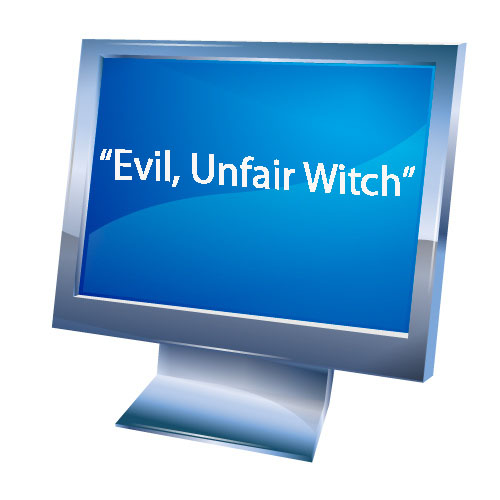 There’s been some uproar on the internet this weekend after the New York Times published an article about what legal professionals can and can’t say on the internet. The story begins with the cautionary tale of attorney Sean Conway, who blogged that a Florida judge was an “Evil, Unfair Witch.” Mr. Conway was brought before the State Bar of Florida to be publicly reprimanded and fined for his name-calling, and is now being further reprimanded by the blogosphere. In fact, the story has been picked up by the Wall Street Journal Law Blog, Legal Geekery, and others. So of course, I have to throw in my two cents worth.
There’s been some uproar on the internet this weekend after the New York Times published an article about what legal professionals can and can’t say on the internet. The story begins with the cautionary tale of attorney Sean Conway, who blogged that a Florida judge was an “Evil, Unfair Witch.” Mr. Conway was brought before the State Bar of Florida to be publicly reprimanded and fined for his name-calling, and is now being further reprimanded by the blogosphere. In fact, the story has been picked up by the Wall Street Journal Law Blog, Legal Geekery, and others. So of course, I have to throw in my two cents worth.
I admit that I wasn’t completely surprised when I saw an article about technology and lawyers. There’s always lots of talk about technology and how it’s changing the practice of law. Firms, including GJEL, are using blogs and Twitter to reach out to other legal professionals and potential clients. It’s only natural for the media to report on how those interactions are changing our profession. But I was surprised by the content of this article in particular. The article focused on the dangers of social media for attorneys, rather than any benefits. But the danger is not social media itself, but rather the failure of the attorneys using it to understand and follow the rules of professional conduct.
We all took some sort of professional responsibility course in law school, and took the Multistate Professional Responsibility Exam (MPRE), too. In fact, every state requires a passing score on the MPRE before an attorney can be admitted to practice, though what qualifies as “passing” varies by state. At any rate, all the attorneys mentioned in the New York Times article should have been aware of the basic rules. If it’s not acceptable to call a judge an “Evil, Unfair Witch” to her face, it’s not acceptable to call her that on a blog or on Twitter, either.
All it takes is a little common sense to apply rules about confidentiality and respect for the judiciary to an attorney’s online presence. It’s wonderful to blog about your expertise or in an effort to reach out to new clients, but the words we put out into the web are restricted by the same rules that apply to our speech and our writing. There are those that argue that this restriction is unfair, and that it restricts attorneys from having the personal blogs and Twitter accounts that others have. But we knew what we were getting into when we signed up for this profession. We knew there would be certain things we couldn’t say or do. And we should be aware that those rules carry over into the virtual world as well.
Rather than criticizing social media and telling lawyers to be exceptionally careful around it, I suggest that we simply remind attorneys of the basic duties they owe to their clients and their profession. Remember the rules of professional conduct, and social media poses no greater danger to you than living the rest of your life does.

